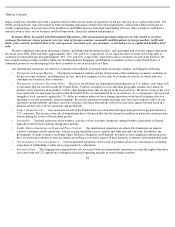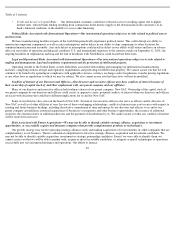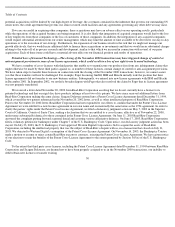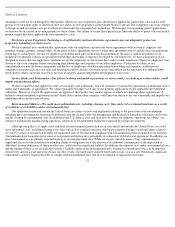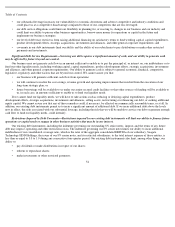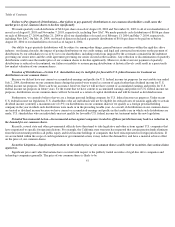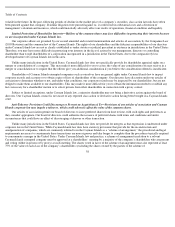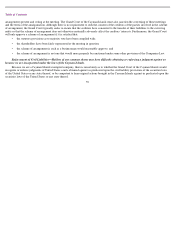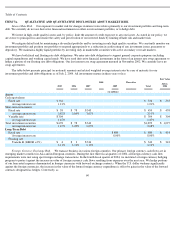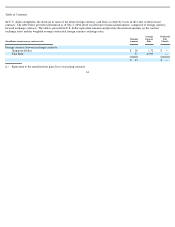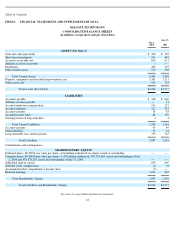Seagate 2003 Annual Report Download - page 59
Download and view the complete annual report
Please find page 59 of the 2003 Seagate annual report below. You can navigate through the pages in the report by either clicking on the pages listed below, or by using the keyword search tool below to find specific information within the annual report.
Table of Contents
volatile in the future. In the past, following periods of decline in the market price of a company’s securities, class action lawsuits have often
been pursued against that company. If similar litigation were pursued against us, it could result in substantial costs and a diversion of
management’s attention and resources, which could materially adversely affect our results of operations, financial condition and liquidity.
Limited Protection of Shareholder Interests—
Holders of the common shares may face difficulties in protecting their interests because
we are incorporated under Cayman Islands law.
Our corporate affairs are governed by our second amended and restated memorandum and articles of association, by the Companies Law
(2003 Revision) and the common law of the Cayman Islands. The rights of our shareholders and the fiduciary responsibilities of our directors
under Cayman Islands law are not as clearly established as under statutes or judicial precedent in existence in jurisdictions in the United States.
Therefore, you may have more difficulty in protecting your interests in the face of actions by our management, directors or controlling
shareholder than would shareholders of a corporation incorporated in a jurisdiction in the United States, due to the comparatively less
developed nature of Cayman Islands law in this area.
Unlike many jurisdictions in the United States, Cayman Islands law does not specifically provide for shareholder appraisal rights on a
merger or consolidation of a company. This may make it more difficult for you to assess the value of any consideration you may receive in a
merger or consolidation or to require that the offeror give you additional consideration if you believe the consideration offered is insufficient.
Shareholders of Cayman Islands exempted companies such as ourselves have no general rights under Cayman Islands law to inspect
corporate records and accounts or to obtain copies of lists of shareholders of the company. Our directors have discretion under our articles of
association to determine whether or not, and under what conditions, our corporate records may be inspected by our shareholders, but are not
obliged to make them available to our shareholders. This may make it more difficult for you to obtain the information needed to establish any
facts necessary for a shareholder motion or to solicit proxies from other shareholders in connection with a proxy contest.
Subject to limited exceptions, under Cayman Islands law, a minority shareholder may not bring a derivative action against the board of
directors. Our Cayman Islands counsel is not aware of any reported class action or derivative action having been brought in a Cayman Islands
court.
Anti-Takeover Provisions Could Discourage or Prevent an Acquisition of Us—Provisions of our articles of association and Cayman
Islands corporate law may impede a takeover, which could adversely affect the value of the common shares.
Our articles of association permit our board of directors to issue preferred shares from time to time, with such rights and preferences as
they consider appropriate. Our board of directors could authorize the issuance of preferred shares with terms and conditions and under
circumstances that could have an effect of discouraging a takeover or other transaction.
Unlike many jurisdictions in the United States, Cayman Islands law does not provide for mergers as that expression is understood under
corporate law in the United States. While Cayman Islands law does have statutory provisions that provide for the reconstruction and
amalgamation of companies, which are commonly referred to in the Cayman Islands as a “scheme of arrangement,” the procedural and legal
requirements necessary to consummate these transactions are more rigorous and take longer to complete than the procedures typically required
to consummate a merger in the United States. Under Cayman Islands law and practice, a scheme of arrangement in relation to a solvent
Cayman Islands exempted company must be approved at a shareholders’ meeting by a majority of the company’s shareholders who are present
and voting (either in person or by proxy) at such meeting. The shares voted in favor of the scheme of arrangement must also represent at least
75% of the value of each class of the company’s shareholders (excluding the shares owned by the parties to the scheme of
58


